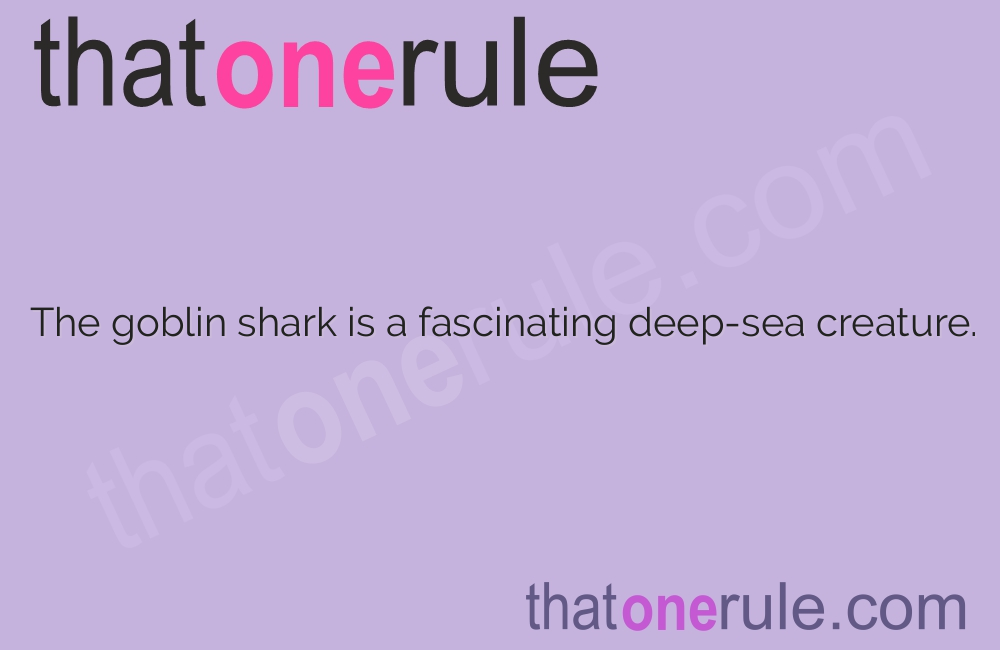Goblin Shark Facts – Unveiling the Mysteries of this Fascinating Deep-Sea Creature

The goblin shark is a fascinating deep-sea creature.
With its long, protruding snout, the goblin shark has a unique appearance.
These sharks are rarely seen by humans due to their deep-sea habitat.
Goblin sharks have a retractable jaw that can extend to catch prey.
Despite their appearance, goblin sharks are actually harmless to humans.
These sharks have been around for millions of years, making them living fossils.
Goblin sharks have a pinkish coloration, making them stand out among other shark species.
Their flexible body helps them maneuver through the deep-sea environment.
Goblin sharks are known for their ability to detect electrical impulses in the water.
These sharks have a slender body shape, allowing them to swim effortlessly.
Goblin sharks primarily feed on smaller fish and crustaceans.
Due to their deep-sea lifestyle, goblin sharks have adapted to survive in extreme pressure environments.
These sharks can grow up to 3.8 meters in length.
Goblin sharks have relatively long lifespans, living up to 35 years.
With their unique appearance, goblin sharks have become a subject of interest for marine biologists.
Despite their elusive nature, scientists have studied goblin sharks using underwater cameras and remotely operated vehicles.
Goblin sharks have a keen sense of smell, allowing them to locate potential prey from a distance.
These sharks are mostly solitary creatures, preferring to live and hunt alone.
Goblin Shark Facts – Unveiling the Mysteries of this Fascinating Deep-Sea Creature part 2
Goblin sharks have a low reproductive rate, with females typically giving birth to only a few pups at a time.
Due to their deep-sea habitat, goblin sharks have few natural predators.
Goblin sharks are considered living relics of ancient shark species.
The retractable jaw of goblin sharks allows for a sudden and powerful bite.
These sharks have specialized teeth designed for capturing and holding onto slippery prey.
Goblin sharks have excellent vision, enabling them to spot prey in low-light conditions.
Given their deep-sea habitat, it is challenging to observe goblin sharks in their natural environment.
Goblin sharks possess an elongated, flattened snout that sets them apart from other shark species.
These sharks are known for their ability to extend their jaws up to a remarkable distance.
Goblin sharks have been identified in various parts of the world, including off the coasts of Japan, New Zealand, and the United States.
Their pink coloration stems from blood vessels located close to the skin’s surface.
Goblin sharks have slender, pointed teeth that are excellent for piercing and capturing prey.
Unlike some other shark species, goblin sharks do not actively hunt humans.
The deep-sea pressures endured by goblin sharks would be fatal to most other animals.
Despite their unique features, goblin sharks are not considered a threat to marine ecosystems.
Goblin sharks have become an iconic figure in the world of marine biology.
The mysterious nature of goblin sharks adds to their allure for marine enthusiasts.
Goblin sharks are thought to be capable of sensing water temperature changes, allowing them to locate prey.
Unlike other shark species, goblin sharks do not have a nictitating membrane to protect their eyes.
Goblin sharks are an excellent example of the incredible diversity found in our oceans.
These sharks have an incredibly oily liver, which aids buoyancy in deep-sea environments.
Goblin sharks have been observed at depths of up to 1,300 meters.
The long, pointed snout of goblin sharks has earned them the nickname vampire shark.
Goblin sharks have a relatively small mouth, making it challenging for them to devour large prey.
Despite their deep-sea lifestyle, goblin sharks occasionally venture into shallower waters, surprising fishermen.
The pink hue of goblin sharks fades after death, turning into a more grayish color.
Goblin sharks serve as a reminder of the vast mysteries that still lie beneath the surface of our oceans.

